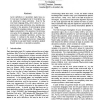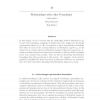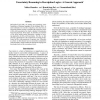133
Voted
IJCAI
2003
15 years 3 months ago
2003
Cyclic definitions in description logics have until now been investigated only for description logics allowing for value restrictions. Even for the most basic language which allow...
113
click to vote
DLOG
2003
15 years 3 months ago
2003
In this chapter, we are concerned with the relationship between Description Logics and other formalisms, regardless of whether they were designed for knowledge representation issu...
122
click to vote
DLOG
2003
15 years 3 months ago
2003
In this short position paper, the project of building intelligent business information infrastructure using semantic web, ontology, description logics, and other related knowledge...
123
click to vote
DLOG
2003
15 years 3 months ago
2003
This chapter considers, on the one hand, extensions of Description Logics by features not available in the basic framework, but considered important for using Description Logics a...
132
click to vote
DLOG
2003
15 years 3 months ago
2003
This chapter covers extensions of the basic description logics introduced in Chapter 2 by very expressive constructs that require advanced reasoning techniques. In particular, we ...
124
click to vote
DLOG
2003
15 years 3 months ago
2003
In a previous paper we have investigated subsumption in the presence of terminological cycles for the description logic EL, which allows conjunctions, existential restrictions, an...
123
click to vote
DLOG
2003
15 years 3 months ago
2003
In this paper we introduce a decidable fixpoint extension of temporal Description Logics. We exploit the decidability results obtained for various monodic extensions of Descripti...
130
click to vote
DLOG
2001
15 years 3 months ago
2001
Description logics have been designed and studied in a modular way. This has allowed a methodic approach to complexity evaluation. We present a way to preserve this modularity in ...
130
Voted
FLAIRS
2006
15 years 3 months ago
2006
Description Logics (DL) are gaining more popularity as the foundation of ontology languages for the Semantic Web. As most information in real life is imperfect, there has been an ...
109
click to vote
DLOG
2006
15 years 3 months ago
2006
In the current paper we investigate the role of Euclidian roles in Description Logics.



